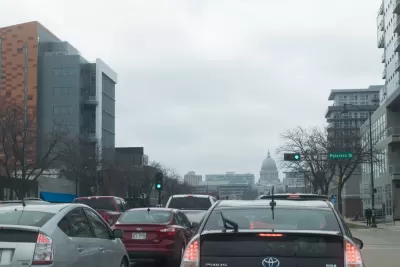Despite major opposition by residents, the Madison Common Council approved a $40 motor vehicle registration fee (aka 'wheel tax') on an 11-8 vote on Oct. 29 to help fund the city's new East-West Bus Rapid Transit system.

"[I]t was clear Tuesday night that the fee was unpopular, both with constituents and the alders, reported Sara Maslar-Donar for the local ABC news affiliate, WKOW, on Oct. 29 (see news video in article).
Mayor Satya Rhodes-Conway made a public plea to alders Tuesday night after several hours of discussion and three failed amendments to the fee, which included lowering it to $20.
“I need your support on this,” she said. “The city needs your support on this.”
Chris Rickert, who reports on Nov. 25 (in source article) on public correspondence received by the common council released under a public records request from the Wisconsin State Journal, shows "opposition to the highest-in-the-state wheel tax was running about 10-to-1." He called the legislation the mayor's "signature initiative."
Writers opposed to the wheel tax called it regressive, said it would hurt the poor and the elderly most, questioned the need for bus rapid transit — which the fee will help fund — and generally urged leaders to tighten the city’s belt.
Voicing support for the wheel tax was Local 6000 of the American Federation of State, County and Municipal Employees; the Wisconsin Public Interest Research Group, RENEW Wisconsin, 1000 Friends of Wisconsin, Clean Wisconsin and Wisconsin Environment; and Curt Witynski, deputy director of the League of Wisconsin Municipalities. [In an email, the Sierra Club's John Muir chapter confirmed their support as well.]
A widespread criticism in the emails was that any additional funds should be directed toward the police, but according to Wisconsin law, revenue from a wheel tax levied by a municipality or county must be directed to "transportation-related purposes." However, the police may see increased funds as a result of the approval, reported Maslar-Donar on Oct. 29:
The fee has been on the table for a few months, and was projected to bring in almost $8 million in 2020. It would fund a variety of transportation projects in the city, which in turn would free up more than $3.5 million from property taxes. The city expects to use that money to fund general items like police and fire.
The tax takes effect Feb. 1, 2020. "Madison will join 20 other municipalities and 12 counties with wheel taxes, but Madison's will be the highest, according to WKOW.
Why no local vote?
Many municipalities charge vehicle registration fees, which often have to be approved by a local vote. Witynski of the League of Wisconsin Municipalities told the State Journal that "the League lobbies the state Legislature about retaining the ability to impose a local vehicle registration without the need to go to a referendum."
Local car tabs repealed in Washington
Washington state municipalities saw their voter-approved "car tabs" annulled on Election Day after state-wide voters approved Initiative 976 on Nov. 5. Seattle, King County, and other entities filed suit on Nov. 13, claiming the initiative is constitutional. They also sought an injunction to prevent the initiative from taking effect on Dec. 8.
Update: sustainability fee
Another type of vehicle registration fee is being considered in Shelby County, Tenn. Mayor Lee Harris proposed a less regressive "sustainability fee" in September that would only apply to the "third and additional" vehicles in multi-car households. Funds would benefit the Memphis Area Transit Authority
Last month he changed the proposal after receiving much public feedback – "only a household's third vehicle would be taxed," reported Richard Brandon for WMC Action News 5 on Oct. 9. "But he may still face an uphill climb," states Brandon in the video. The vote should go before the Shelby County Board of Commissioners in February.
- Transit Dreams Follow 'Wheel Tax' Proposal in Madison, October 15, 2019
- See three posts tagged "East-West BRT."
FULL STORY: Emails to Madison leaders reveal strong opposition to $40 wheel tax

Maui's Vacation Rental Debate Turns Ugly
Verbal attacks, misinformation campaigns and fistfights plague a high-stakes debate to convert thousands of vacation rentals into long-term housing.

Planetizen Federal Action Tracker
A weekly monitor of how Trump’s orders and actions are impacting planners and planning in America.

San Francisco Suspends Traffic Calming Amidst Record Deaths
Citing “a challenging fiscal landscape,” the city will cease the program on the heels of 42 traffic deaths, including 24 pedestrians.

Defunct Pittsburgh Power Plant to Become Residential Tower
A decommissioned steam heat plant will be redeveloped into almost 100 affordable housing units.

Trump Prompts Restructuring of Transportation Research Board in “Unprecedented Overreach”
The TRB has eliminated more than half of its committees including those focused on climate, equity, and cities.

Amtrak Rolls Out New Orleans to Alabama “Mardi Gras” Train
The new service will operate morning and evening departures between Mobile and New Orleans.
Urban Design for Planners 1: Software Tools
This six-course series explores essential urban design concepts using open source software and equips planners with the tools they need to participate fully in the urban design process.
Planning for Universal Design
Learn the tools for implementing Universal Design in planning regulations.
Heyer Gruel & Associates PA
JM Goldson LLC
Custer County Colorado
City of Camden Redevelopment Agency
City of Astoria
Transportation Research & Education Center (TREC) at Portland State University
Jefferson Parish Government
Camden Redevelopment Agency
City of Claremont





























